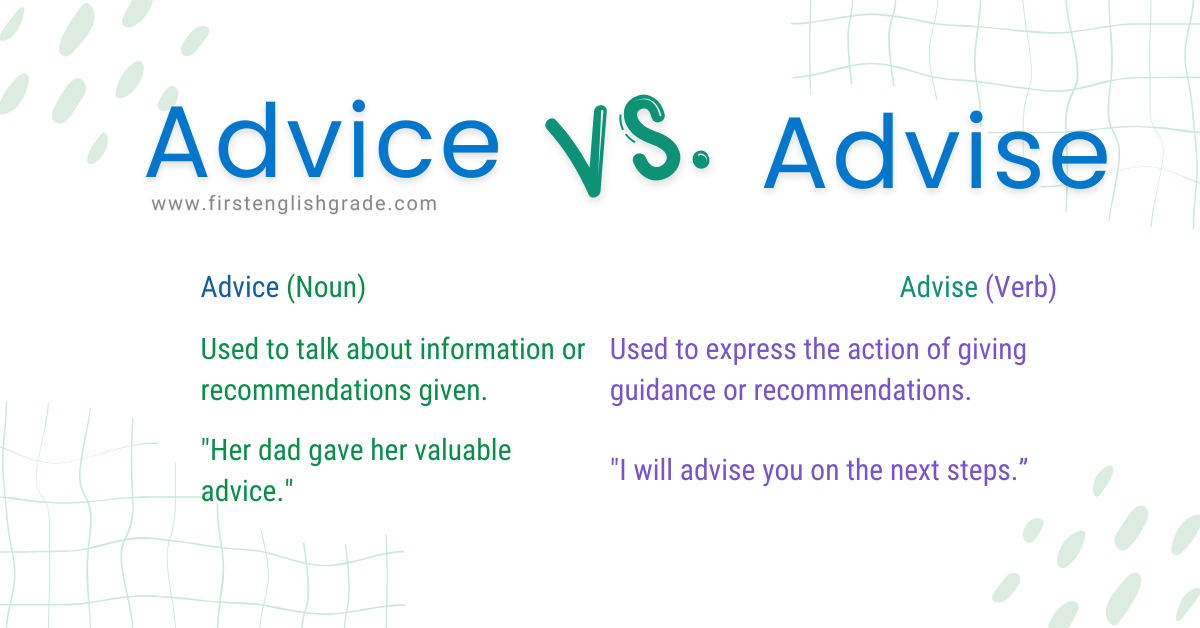Advice vs. Advise: In the English language, there are words that may seem similar but have different meanings and uses. Two such words are “advice” and “advise.” These words are often confused and misused, by English learners. The main difference between advice and advise lies in their function and form. “Advice” is a noun, while “advise” is a verb.
Advice vs. Advise: Understanding the Difference
Advice Meaning
Advice is a noun that means a suggestion or opinion given to help someone decide what to do. For instance, one might seek advice from a mentor on career decisions. Or, turn to a friend for relationship advice.
Example: “My sister Molly gave me great advice on how to study for the test.“
Advise Meaning
Advise functions as a verb, which means to suggest or recommend something to someone. When you advise someone, you offer suggestions or recommendations on what to do.
Example: “I advise you to save some money each month.“
Examples of Advice in Sentences
- Her dad gave her valuable advice on preparing for the job interview.
- I need some advice on choosing the right college for my studies.
- His advice on effective studying techniques contributed to better academic performance.
- I need your advice on choosing a new laptop.
Examples of Advise in Sentences
- I advise you to carefully consider all options before making a decision.
- The teacher advised the students on effective time management strategies.
- Can you advise him on the best approach to handle this problem?
- I advise you to carefully consider all options before finalizing.
Key Differences Between Advice and Advise
The table below shows the main differences between advice and advise. It highlights their part of speech and use in sentences.
| Aspect | Advice | Advise |
| Part of Speech | Noun | Verb |
| Usage in Sentences | To talk about information or recommendations given. | To express the action of giving guidance or recommendations. |
| Examples | His advice helped me make smarter investment decisions. | The doctor will advise you on a suitable diet plan for your health. |
| Her advice to stay calm during the presentation really helped me. | Can you advise me on the proper way to use this software? |
Advice vs. Advise: Common Mistakes
Misusing the words
One common mistake is using “advise” as a noun, such as in the sentence “I would like to thank you for your advise.” The correct form should be “I would like to thank you for your advice.”
Another mistake is using “advice” as a verb, such as in the sentence “I advice you to reconsider.” The correct form should be “I advise you to reconsider.”
Mispronunciation
Advice is pronounced with an “s” sound at the end, while advise is pronounced with a “z” sound at the end. For example, “I need some advice” (pronounced as “ad-vice”) and “She advises me to take a break” (pronounced as “ad-vize”).
Incorrect usage in sentences
“Please advice” is incorrect, and should be “please advise” to use the verb form. For example, “Please advise her on the most suitable method for this task.”
Correct Use of Advice and Advise
Let’s see how you can use “advice” and “advise” correctly, with more examples for better understanding.
Using “Advice”
Remember, “advice” is a noun. You use it to refer to suggestions or opinions offered by someone. Here are some more examples:
- “He asked for advice on which university to attend.”
- “The English teacher offered advice on how to improve my essay.”
- “Mr. Brown’s advice helped me make a tough decision in that situation.”
- “I received good advice on how to care for my indoor plants.”
In each of these examples, “advice” is a noun that describes the helpful suggestions someone receives.
Using “Advise”
On the other hand, “advise” is a verb. It means giving someone a suggestion or recommendation. Here are some more examples:
- “Can you advise him to study for the upcoming test?”
- “The lawyer advised me to read the contract carefully.”
- “My manager advised me to take a break and relax.”
- “The doctor advised her to exercise regularly.”
- “He advised us to be cautious while driving in the snow.”
In these examples, “advise” is a verb that shows someone suggesting an action or course of action to another person.
Additional Tips
- “Advice” is an uncountable noun, so you cannot use it with “a” or “an.” For example, you should say, “She gave me good advice,” instead of “She gave me a good advice.”
- “Advise” can take different tenses (advise, advised, advising), so be sure to match the verb tense to the rest of your sentence. For example:
- “He advised me yesterday,” (past tense).
- “I am advising her right now,” (present progressive).
By practicing these examples and keeping these tips in mind, you can use “advice” and “advise” correctly and confidently in your writing and speaking.
Advice vs. Advise FAQs
What is the difference between advice and advise?
“Advice” is a noun and refers to a recommendation or opinion offered with the intention of helping someone make a decision or take action. “Advise” is a verb and means to give advice or to recommend a course of action.
Is it correct to say “I advice you to reconsider”?
No, the correct form is “I advise you to reconsider.”
Is it correct to say, “I would like to thank you for your advise”?
No, the correct sentence is: “I would like to thank you for your advice.”
Which one is correct: seek advice or advise?
The correct usage is “seek advice.” When you are looking for guidance, suggestions, or recommendations, you should seek advice. “Advise” is a verb used when providing guidance or recommendations to someone else.
Which one is correct: appreciate your advice or advise?
The correct phrase is “appreciate your advice.” “Advice” is the noun form, while “advise” is the verb. When expressing gratitude for someone’s guidance or recommendations, use “appreciate your advice.”




